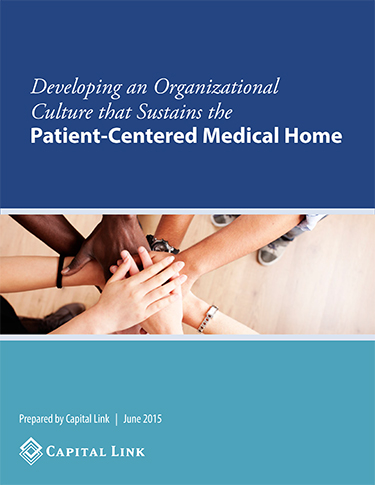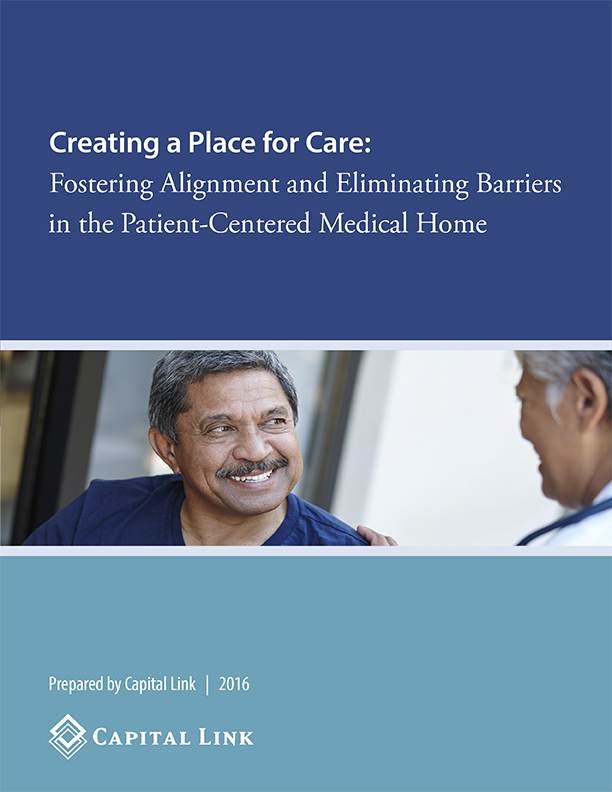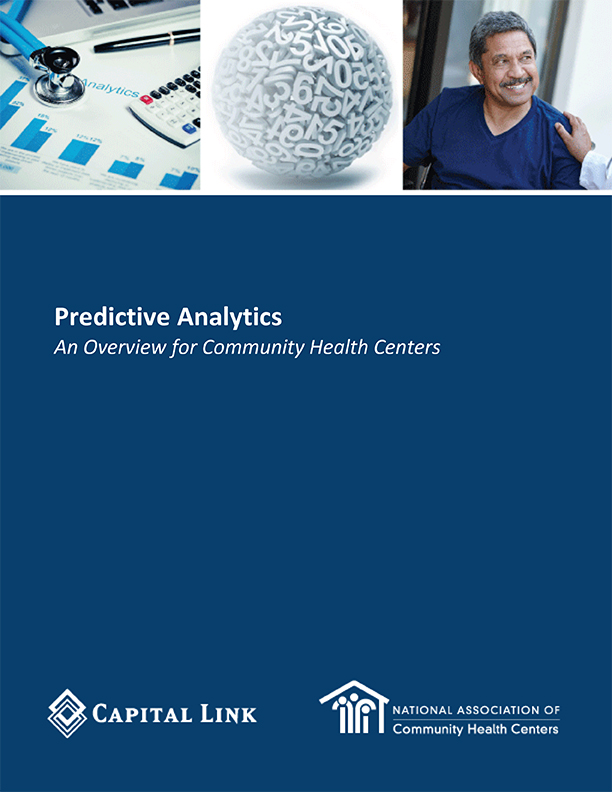![]()

![]()
A Quarterly Resource Bulletin from Capital Link
![]()
Message from the CEO
Allison Coleman, CEO
We enjoyed seeing so many of you at the CHI in Chicago a few weeks ago and learning more about the incredible work health centers are all doing to create healthy communities, from integrating behavioral and primary care services to addressing the social determinants of health. With health centers now serving one in 13 Americans, you should take pride in the important role you are playing to shape the health care system of the future.
It was a busy summer for Capital Link, having recently released several new publications on a variety of important topics, including how to sustain a patient-centered medical home, use predictive analytics to drive performance, and an update to help health centers seize the opportunities presented by the five-year extension the New Markets Tax Credit (NMTC) Program. Soon we will also be releasing the results from our latest national health center capital needs assessment, so be sure to keep an eye out for our announcement. A big thank you to all of you who completed our shortened online assessment – your participation is crucial to understanding the needs of health centers nationwide.
As we continue to grow, we would like to update you on a few staffing additions here at Capital Link and our lending affiliate, Community Health Center Capital Fund. Jose Fonseca has joined Capital Fund as Portfolio Manager, focusing on monitoring and administering the loan portfolio. We’d also like to welcome Daniel Moss as Capital Link’s new Maryland-based Project Consultant. We’d also like to welcome two new Boston-based Capital Link staff: Lorenda Ziazikova as Accounting Manager and Allyson Butler as Program Coordinator. We’re delighted to have all of them aboard.
As always, this latest issue of Capital Ink also offers a federal update, health center highlights, and a complete list of our upcoming events. We hope you find it helpful.
![]()
Federal Update
Keep Up to Date!
Below is a selection of recent health policy and regulatory news and information relevant to health centers and PCAs. For regular updates, subscribe to Capital Link’s blog and access the following links:
NACHC’s Health Centers on the Hill and Policy Shop blogs
The Health Resources and Services Administration’s health center tab
The newsroom at the U.S. Department of Health and Human Services
HHS Funding Annoucements
HHS Awards Over $87 Million for Health Center IT
On September 15, 2016, Health and Human Services (HHS) announced over $87 million in funding for 1,310 health centers across the U.S. The funding will support health information technology enhancements to accelerate health centers’ transition to value-based models of care, improve information sharing efforts, support informed decision making, and increase engagement in delivery system transformation. Read more here.
HHS Awards Health Centers $8.6 Million in Patient-Centered Medical Home Funding
On August 4, 2016, Health and Human Services (HHS) announced more than $8.6 million in funding for 246 health centers nationwide to help to improve the quality and the experience of care through the Patient-Centered Medical Home health care delivery model. Learn more here.
HHS awards $36 million to health centers for HIT
On July 21, 2016, HHS announced more than $36 million to 50 Health Center Controlled Networks nationwide for the adoption of health information technology. Learn more here.
HHS awards $156 million to health centers to expand oral health services
On June 16, 2016, HHS announced nearly $156 million in funding to 420 health centers across the country. This funding will expand health centers’ integrated oral health care services by enabling the hiring of approximately 1,600 new dental staff to treat nearly 785,000 new patients. Learn more here.
HRSA Releases New FQHC Look-Alike Designation Application Instructions
On September 13, 2016, the Health Resources and Services Administration (HRSA) released new instructions for applying for a Health Center Program Look-Alike initial designation. The updated instructions and application, which allows health centers that do not receive Health Center Program funding to apply to become part of the Program as “look-alikes,” and associated resources are available on HRSA's Look-Alike Technical Assistance webpage.
Secretary Hillary Clinton Announces Plan to Expand the Reach of Community Health Centers
On July 12, 2016, Presidential candidate and former Secretary of State Hillary Clinton (D) proposed a plan to significantly increase and expand mandatory federal funding for community health centers. To learn more about the proposed plan, click here and here.
Senate Appropriations Committee Approves FY2017 LHHS Bill
In June, 2016, both the Senate and House Appropriations Committees approved the first bipartisan Labor, Health, and Human Services (LHHS) Appropriations bill in seven years. Should it become law, it would continue the current Health Centers Program funding level of $5.1 billion in FY17, which includes $100 million in funding for health centers to expand mental health and opioid prevention and treatment services. Of note, both bills contained report language as follows: “The Committee recognizes the need for capital resources at community health centers to meet increased demand and upgrade facilities. The Committee supports administrative changes to the HRSA Loan Guarantee Program designed to improve its efficiency and better align the program with other successful Federal loan guarantees, and to increase utilization of this tool to leverage outside resources to meet health centers’ capital needs.”
Learn more here and here.
New and Noteworthy
2015-2016 New Markets Tax Credit Program Allocation Awards − Are You Ready?
Under the New Markets Tax Credit Program (NMTC Program) changes announced by the Community Development Financial Institutions (CDFI) Fund last spring, we anticipate that the 2015-2016 tax credit allocation awards for Community Development Entities (CDEs) will be announced in the next few months—and that the award amounts will total $7 billion, an historic high for the program. As organizations focused on providing financing in economically-distressed areas, CDEs work to attract investors (primarily banks and large corporations) to provide them with capital in exchange for federal tax credits. CDEs, in turn, lend or invest this capital in businesses located in targeted census tracts, such as community health centers, to spur economic growth.
To help health centers take advantage of this opportunity, Capital Link has prepared a variety of new resources, described below:
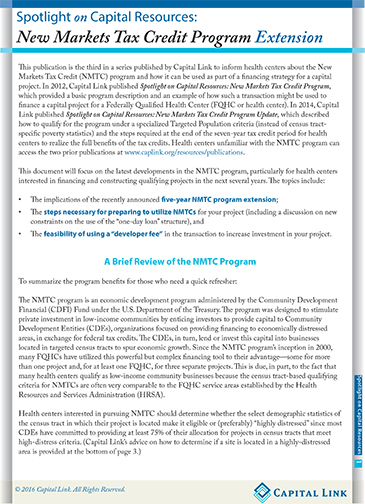 |
Spotlight on Capital Resources: New Markets Tax Credit Program Extension Webinar: Financing Health Center Projects with New Markets Tax Credits |
In addition to the new NMTC publication and upcoming webinar, we will once again be offering a New Markets Tax Credit Readiness Program, designed to assist health centers in accelerating their preparedness for NMTC financing. Through this program, we will be actively working with a select group of health centers that have projects that need financing within the next year. As a result of grant funding from our NMTC financing affiliate, Capital Fund, up to 10 health centers will be eligible to receive this assistance at reduced cost. To find out how Capital Link can help your health center capitalize on this financing option, please contact Jonathan Chapman, Director of Community Health Center Advisory Services at 970-833-8513 or This email address is being protected from spambots. You need JavaScript enabled to view it..
To learn more about the NMTC program and how it works, access all of our Spotlight on Capital Resources: New Markets Tax Credit Program resources here on our website.
Strengthening Health Center Performance through Effective Revenue Cycle Management
As health centers seek to stabilize and improve their financial and operational performance, the revenue cycle management (RCM) function is a critical area of focus. RCM is the process of capturing, managing, and collecting patient service revenue starting with appointment scheduling and ending with the final adjudication of the claim. Maximizing the efficiency of RCM can improve a health center’s cash flow by increasing collections (revenues) and decreasing costs (expenses) without negatively affecting clinical outcomes and patient satisfaction.
The FQHC Revenue Cycle
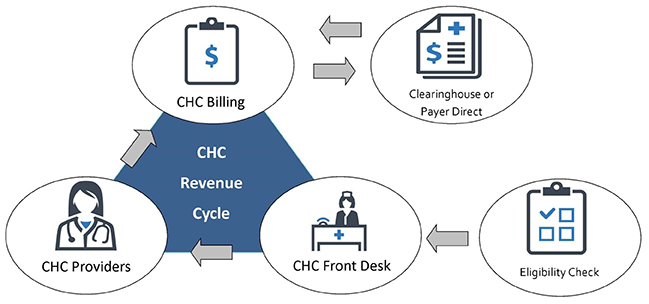
Source: Priority Management Group, Inc. (PMG) (2015). California Primary Care Association Revenue Cycle Management Program [PowerPoint slides].
While some health centers have the capacity and expertise to effectively manage the complex process of billing and collecting of patient accounts internally, other health centers find outsourcing RCM to industry experts to be a better solution. For some, the inability to find, hire, and retain qualified staff is the main driver of outsourcing RCM. For others, it is anticipated cost savings.
In response to health centers’ interest in better managing RCM, Capital Link has recently conducted several trainings and presentations on the topic, the most recent being Strengthening Health Center Collections through Effective Revenue Cycle Management at the NACHC CHI & EXPO. Content has included:
-
The impact of health reform on health center billing and collections, with best practices to respond.
-
Best practices and “on the ground” implementation strategies for improving health centers operational cash flow and financial viability.
-
How RCM and the billing process has changed as health centers move through Affordable Care Act implementation.
-
Which metrics to monitor and benchmark, what they mean, and the tools/reports available to help health centers assess their performance compared to industry standards to help them better manage and track the RCM function and improve its effectiveness.
-
What and how to calculate a denial rate and identify the factors that driving the figure and how to improve it.
-
How to optimize Electronic Medical Records and Electronic Practice Managements systems (EMR/EPM) and how it can affect financial statements.
To further address the challenges of RCM, Capital Link is currently developing tools and planning future trainings. We’d like to make the content as relevant for health centers as possible. We encourage you to submit any suggestions for content you may have. Please email us at This email address is being protected from spambots. You need JavaScript enabled to view it..
Improving Patient/Staff Satisfaction and the Bottom Line with Optimal Performance Services
Despite their best efforts, health centers face a myriad of challenges that can lead to net losses, frustrated providers, exhausted staff, and declining patient satisfaction. To help health centers break this cycle, Capital Link is collaborating with experts at HealthMETRICS to help health centers improve performance while increasing patient and staff satisfaction through a practice known as Optimal Performance Services (OPS).
OPS is an interactive process to help health centers understand the operational drivers of their performance, how their process of delivering care influences the drivers, and how specific interventions can lead to positive results. Newly customized for health centers, OPS is based on a strategy that has been successfully applied to more than 400 healthcare providers over the past 10 years. Past implementations have increased productivity by 20% or more, providing better access to care while improving patient and staff satisfaction and boosting operating margins. HealthMETRICS’ confidence in the results achieved through the OPS process is expressed through a guarantee that a client’s annual bottom-line benefit will far exceed the project costs. Having completed over 400 projects, this guarantee has never been challenged.
Below are two examples of health centers that have recently completed this process, part of a successful pilot program.
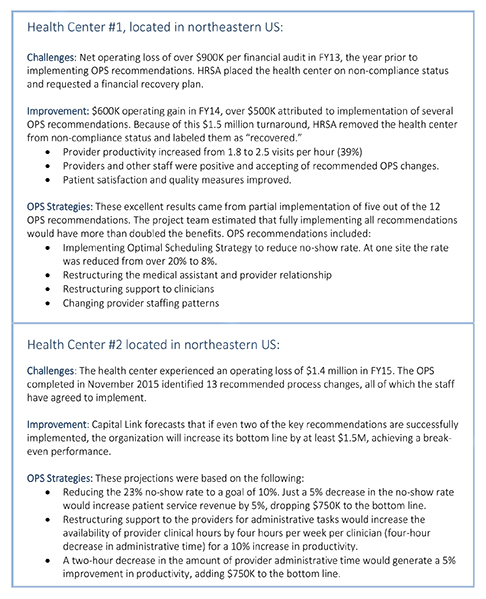
To learn more about OPS, visit our website or contact Mark Lurtz, Director of Partnership Development, at 636-244-3082 or This email address is being protected from spambots. You need JavaScript enabled to view it..
Thank You for Participating in Our National Capital Needs Assessment
We want to thank all of the health centers that participated in our national capital needs assessment. Your help in compiling this information is invaluable!
Results of this important assessment will:
-
Inform the development of new capital financing programs and technical assistance services—from which all health centers can benefit
-
Help identify the most effective strategies for health centers to secure capital funding to achieve their expansion goals
-
Help to educate capital funding sources and policy makers regarding the scale and types of health center capital needs and related funding requirements necessary to expand health center operations
A report with the results from this assessment will be available soon. You can access the results from our last national capital needs assessment, Capital Plans and Needs of Health Centers: A National Perspective, here on our website.
![]()
Resources
Developing an Organizational Culture that Sustains the Patient-Centered Medical Home: Lessons Learned
The transition to a PCMH often involves a shift in work culture within an organization. Moving to a team-based approach to primary care requires total commitment on the part of all staff; roles often need to be redefined and work processes redesigned. This resource examines the cultural challenges and successes health centers face in transforming to this new model of primary care delivery, offering considerations for the patient, family, and staff experience and describing the optimal organization structure. This resource was developed with support from HRSA and can be accessed here.
Creating a Place for Care: Fostering Alignment and Eliminating Barriers in the Patient-Centered Medical Home
This resource provides health centers with insight on how to respond to and reflect the unique needs and preferences of the patients they serve in order to align their facility design with their process of care, and the people they support. This resource was developed with support from HRSA. Click here to access.
Predictive Analytics: An Overview for Community Health Centers
Predictive analytics is becoming more applicable to health care, and will eventually become essential for health centers to improve patient care, reduce costs, and negotiate favorable contracts with payers. Predictive Analytics: An Overview for Community Health Centers, a new resource developed by Capital Link and NACHC, provides health centers with a summary of predictive analytics, its history and development, the data and resources needed to predict a patient’s future behavior, and how health centers can begin utilizing it. It also includes specific examples of organizations that have successfully used predictive analytics. This resource was developed with support from HRSA and can be accessed here. and MyNACHC.
![]()
Health Center Highlights
Capital Link regularly profiles health centers that have successfully completed their expansion plans. These health center stories are available on our website. Our most recent profile is on Family Health Centers of San Diego, CA.
In addition, we'd like to congratulate the following health centers:
Family Health Centers of San Diego, CA recently closed its third NMTC transaction. The new $8.5 million El Cajon Family Health Center project was a renovation of a 25,000 square foot building that at one time housed a call center. When fully staffed (83 FTE), the clinic will offer primary care with a focus on OB/GYN and pediatrics, as well as dental, behavioral health, speech therapy, and vision services.
Harbor Health Services, Inc., MA celebrated a groundbreaking ceremony in Brockton, MA, pictured below. Renovations are now underway for the agency’s second Program of All-Inclusive Care for the Elderly (PACE®) site. Capital Link lending affiliate, Capital Fund, together with MassDevelopment, provided NMTC allocation for the $12.2 million project, which is expected to be completed by the middle of next year.
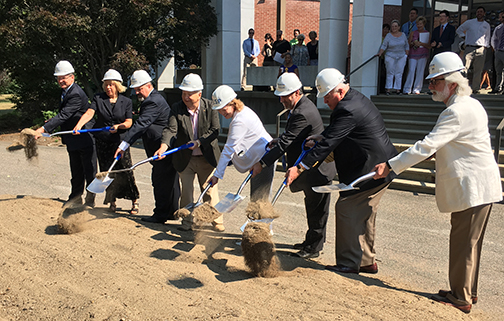
Lowell Community Health Center, MA recently closed financing on its $27 million expansion. Capital Fund is proud to be part of the group of lenders providing NMTC financing for the project, which will nearly double the health center's capacity to provide urgently-needed primary health care, vision and dental services to Lowell’s underserved residents. Read more here.
Capital Link worked closely with FHCSD, Harbor Health Services, and Lowell Community Health Center to develop their respective business plans and assemble the financing for these substantial projects.
Mountain Park Community Health Center, AZ closed its financing for a new clinic in Tempe, AZ, scheduled to open in 2017. Capital Fund, with the Local Initiative Support Corporation (LISC) under the Healthy Futures Fund 2.0 initiative (HFF), provided a subordinated loan to finance the new facility, which will expand Mountain Park’s services by approximately 200%.
![]()
Upcoming Events
Capital Link regularly attends industry conferences to exhibit, conduct trainings, and present information related to capital development to health centers and primary care associations. Below are a few of our next scheduled events.
Education Sessions
Missouri Primary Care Association Annual Clinical & Quality Conference
September 22-24, 2016
Branson, MO
Exhibitor Booth #38
Hallmarks of High Performance: Exploring the Relationship between Clinical, Financial and Operational Excellence at America’s (and Missouri’s) Health Centers
Saturday, September 24, 8:30-10:00 am
Speaker: Allison Coleman, Chief Executive Officer, Capital Link
Read more here
Community Clinic Association of Los Angeles County Advancing Financial Strength Program Kick-Off
September 27, 2016 @ 9:00 am – 1:30 pm
Los Angeles, CA
2016 CHAMPS/NWRPCA Fall Primary Care Conference
Saturday, October 15, 2016
Denver, CO
Assessing Your Environment: Health Centers as Assets in Their Community
Saturday, October 15, 2016, 10:30-12:00 pm
Speaker: Jonathan Chapman, Capital Link
Strengthening Collections through Effective Revenue Cycle Management
Monday, October 17, 2016, 3:30-5:00 pm
Speaker: Dale Johnson, Capital Link
Iowa Primary Care Association Annual Conference
October 18-19, 2016
West Des Moines, Iowa
Hallmarks of High Performance
Day/Time TBD
Oklahoma Primary Care Association Annual Conference
October 26-28, 2016
Oklahoma City, OK
Hallmarks of High Performance
Thursday, October, 27th, 1:45-3:00 pm
NACHC 2016 PCA and HCCN Conference
November 14–16, 2016
Pasadena, CA
Advancing Financial Strength: Leveraging Networks and National Cooperative Agreements to Support Health Center Sustainability (HTuC3)
Tuesday, November 15th, 4:00 pm – 5:30pm
Speakers: Susan Petrie, Chief Operating Officer, Capital Link; and Louise McCarthy, President and CEO, Community Clinic Association of Los Angeles County
Predictive Analytics and Business Intelligence (HTuC2)
Tuesday, November 15th, 2:15pm-3:45 pm
Speakers: Jonathan Chapman, Director of Community Health Center Advisory Services, Capital Link and Beth Wrobel, Chief Executive Officer, HealthLinc
Exhibiting
California Primary Care Association Annual Conference
October 27-28, 2016
Long Beach, CA
Webinars
Capital Link’s next series of seasonal webinars are beginning soon and are posted here on our website. You can find recordings of our past webinars here. Our next scheduled webinar is:
Financing Health Center Projects with New Markets Tax Credits
Thursday, October 13, 2016, 2-3 p.m. ET
Register by clicking here.
![]()


